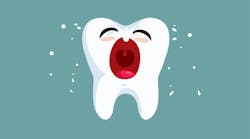Can you have your ice and eat it, too?
It's a widely accepted tenet that staying hydrated by drinking water is good for one's overall health and well-being,1 but people around the world have varying preferences on exactly how they prefer their water. Visit most any European country, for example, and you'll be served a room-temperature beverage. Americans, however, are infatuated with ice-cold drinks.
A 2020 survey conducted by Bosch indicated that 51% of Americans classify themselves as "ice-obsessed" and 56% say they flat-out won't drink water unless it's cold.2 A recent TikTok trend backs up those stats.3 In around 80 million "watertok" posts to-date, content creators across the social app have been touting affordable countertop nugget ice machines and showing off their "water recipes." Typically, these videos consist of users demonstrating how to make drinking water "fun" by adding flavored syrups and sweeteners to their drinks.
So, with all this recent buzz about water and nugget ice in particular, it makes sense to ask whether consuming large amounts of ice affects one's oral health.
Downsides of chewing ice
Chewing ice may not seem harmful, but it can cause long-term damage if not properly addressed.4 Tooth enamel is strong, but so is ice; frequently chewing it can cause small cracks, which can widen and spread over time. This can eventually fracture the tooth, which is especially dangerous if it has a filling. The fracture may cause the restoration to pop out, thus welcoming bacteria that can lead to a cavity.4 Think of it like a windshield crack: even a small, innocuous chip can spider into a large crack that threatens the structural integrity of the glass.
Not only that, but ice can damage crowns, veneers, and the surrounding enamel, leaving the tooth more sensitive to hot and cold liquids and foods.5
Possible signs of iron deficiency
Serial ice-chewing may also be a sign of an iron deficiency or other nutritional problems. Anemia has been linked to "pica," which is a term that describes craving and chewing substances with no nutritional value (like ice).5
An iron deficiency may cause dry mouth, increased tooth and gum sensitivity, white spots on the tongue, bleeding in the mucous membranes, or a receding gum line. Side effects may also include swollen gums and mouth sores.6
Alternatives to snacking on ice
There are a couple ways for patients to safely mitigate their ice-chewing habit while still getting their fix. Instead of chewing ice cubes or nugget ice, they can opt for shaved ice instead, which is softer and easier to chew5 (and those following "watertok" content can also still add flavor to their ice this way).
If patients are more drawn to the oral stimulation of chewing on ice (rather than the flavor itself) they can ditch their "watertok" recipies altogether and opt for a healthier substitute to their oral fixation, such as chewing on carrots, apple slices, or cucumbers.5
While indulging in flavored ice recipes may be enjoyable, it's important for patients to be mindful of the potential oral health risks and consider safer alternatives to protect their teeth and gums.
References
1. Leech J. 7 science-based health benefits of drinking enough water. Healthline. March 8, 2023. Accessed June 27, 2024. https://www.healthline.com/nutrition/7-health-benefits-of-water
2. Bosch study reveals Americans are "ice obsessed," consuming 400 pounds each per year. Bosch. December 2, 2020. Accessed June 27, 2024. https://www.bosch-home.com/us/press/pressrelease-5056
3. Nugget ice. TikTok. https://www.tiktok.com/channel/nugget-ice
4. Love chewing ice? It's not good for your teeth. Heath University of Utah. June 22, 2023. https://healthcare.utah.edu/healthfeed/2023/06/love-chewing-ice-its-not-good-your-teeth
5. Chew on this: Ice crunching and your teeth. Colgate. January 9, 2023. https://www.colgate.com/en-us/oral-health/adult-oral-care/chewing-ice
6. Jacob RF. How does anemia affect your dental health? Ronald F. Jacob, DMD. May 10, 2023. https://www.rjacobdmd.com/blog/how-does-anemia-affect-your-dental-health/
About the Author

Sarah Butkovic, MA, BA
Sarah Butkovic, MA, BA, is an Associate Editor at Endeavor Business Media, where she works on creating and editing engaging and informative content for today's leading online dentistry publications. She holds a Master's English Language and Literature from Loyola University Chicago and is passionate about producing high-quality content that educates, inspires, and connects with readers.
Sara Joyce, Managing Editor
Sara Joyce is the managing editor of RDH and Dental Economics magazines and comprehensive oral health-care website, DentistryIQ. She has a BA in linguistics and an undying love for the Oxford comma. Contact Sara at [email protected].



